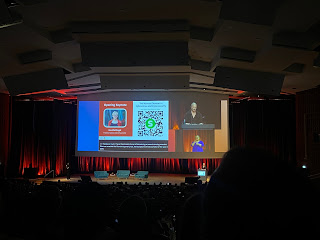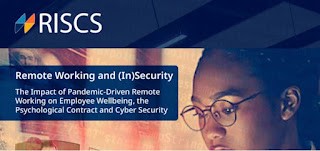CHI 2023: Jessica McClearn and Mikaela Brough
ACM CHI is a five-day-long top-tier conference on Human-Computer Interaction. This year it was held in Hamburg with over 4000 attendees from 72+ countries. We decided to attend this conference as our research interests revolve around the social foundations of security. Jessica is interested in security practices in post-conflict societies, while Mikaela focuses on perceptions of secure messaging in activist communities. We believed that this conference would provide valuable insights into our respective areas of interest. Our experience at CHI (pronounced ’kai’) was truly amazing, and we found it to be a highly worthwhile conference to attend. With the opening ceremony feeling somewhat like Eurovision, it set the tone for an exciting and eclectic week ahead! The opening keynote prioritised human aspects of cybersecurity, highlighting the growing space for information security researchers within the CHI community.
It was the first time for both of us to attend CHI and we were both amazed by the range of research related to Human-Computer Interaction. CHI is a top-tier conference in the field of Human-Computer Interaction (HCI - a multidisciplinary sub-area of Computer Science and Engineering) and has a rich history and academic culture associated with it. This was evident throughout the five days we spent there. The conference featured multiple tracks with a wide range of activities, including paper sessions, Special Interest Groups (SIGs), workshops, and courses. Some sessions that stood out to us were focused on privacy perceptions, inclusive futures, authentication and smart environments, marginalized communities, reflections, and (un)ethical design. We also particularly enjoyed the SIGs, attending discussions on creativity and culture, as well as data-driven approaches to design. These SIGs provided valuable spaces for connecting with fellow scholars and engaging in meaningful discussions, which can sometimes be lacking during paper sessions.
The best part of CHI was the opportunity to meet numerous researchers from different parts of the world working on fascinating projects. With nearly 5000 attendees, the conference encompassed a wide range of research areas, such as Virtual Reality, Healthcare, and Artificial Intelligence, among others. We met numerous individuals whom we would love to collaborate with and hope to maintain these relationships in the future.
Another highlight of the conference was the ’AltCHI’ session on emerging and unorthodox research in human-computer interaction. This session sparked thought-provoking discussions and left Mikaela feeling inspired to explore more experimental methodologies in her work. In general, each person we encountered had unique expertise, broadening our perspective on informatics as a whole.
A highlight of the week for Jessica was Co-leading the workshop on the final day of CHI on ‘Diverse Migration Journeys and Security Practices: Engaging with Longitudinal Perspectives of Migration and (Digital) Security’1 with Dr Ruba Abu-Salma. With a thank you to Dr Rikke Jensen and Dr Reem Talhouk for the opportunity to be involved in the organisation and running of the workshop. It was a fantastic opportunity to meet with international academics working on related research topics from universities in Germany, Finland, UK and the US, to name just a few. This workshop is just the start of a research collaboration on this topic.
The conversations held around research approaches between the Global North and Global South communities were particularly helpful for Jessica’s research as she reflects on previous research she completed in Lebanon and moving forward where she will continue research in Colombia. The paper on doing HCI research in Latin America, ‘Para Cima y Pa’ Abajo: Building Bridges Between HCI Research in Latin America and in the Global North’2 presented by Pedro Reynolds-Cuéllar, Marisol Wong-Villacres and other members of the research team, gave space for such conversations. The paper highlighted many insights, including the importance of relationships and the importance of time when conducting sustainable, ethical research and to build trust within communities. This talk was very informative and provided valued connections for Jessica to develop her PhD research.
Another aspect worth mentioning is the conference venue itself. The organizers did an excellent job selecting a location that provided a conducive environment for networking and collaboration. The spacious main exhibition hall was filled with interactive demos and physical prototypes, offering a glimpse into some late-breaking advancements in technology and user experience. We had the opportunity to try out innovative interfaces and engage in conversations with the developers, fostering a sense of excitement and anticipation for the future of the field. Hamburg is an extraordinary city, and we feel fortunate to have experienced it.
Before arriving, Mikaela had limited knowledge of Hamburg, but was captivated by its distinctive atmosphere. The city boasts a vibrant culture and art scene, and Mikaela particularly enjoyed visiting the Deichtorhallen contemporary art gallery. Exploring the city with conference attendees created strong bonds and allowed us to forge personal connections beyond professional formalities. After the conference sessions concluded (running from 9 am to 6 pm daily), there were fantastic receptions, networking events, and ample time to explore Hamburg with newfound acquaintances. The evenings were spent networking over dinners and outings in the city, attending meetings such as those held by CHIversity and country specific CHI groups. It was great to consolidate the relationships with those doing fascinating research through shared moments exploring the city.
Working in an information security department, it can be easy to overlook aspects of technology outside the realm of security. Given our interest in conducting ethnographic-style research, it was crucial for us to engage with diverse research areas and become part of such a well-established and extensive academic community. These connections and perspectives will be vital in advancing our research endeavours moving forward.
[1] https://dl.acm.org/doi/10.1145/3544549.3573800
[1] https://dl.acm.org/doi/10.1145/3544548.3581138



Comments
Post a Comment